Discover the core modules of SAP Business One designed to enhance SMB efficiency:
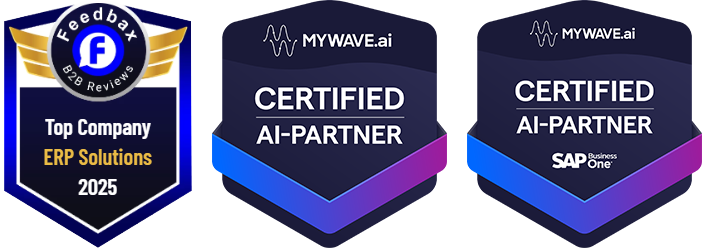
SAP Business One is a comprehensive Enterprise Resource Planning (ERP) software solution crafted to meet the unique needs of small and medium-sized businesses (SMBs). It encompasses a broad range of features including financial management, sales and customer management, inventory and production management, along with extensive analysis and reporting capabilities. Its modular structure allows SAP Business One to be customized to cater to the specific requirements of each business, providing a scalable and robust solution to streamline business processes and support informed decision-making.
According to a study by IDC, a leading market research firm, SAP Business One holds a top position in the global market for ERP software tailored for smaller businesses. This recognition underscores SAP Business One’s effectiveness and flexibility for the mid-market and small businesses, which were highlighted as “Major Players.”
With around 80 percent of its customer base being SMBs, SAP understands the need to optimize and simplify IT processes. SAP Business One is at the heart of these efforts, serving as a key SAP software solution for small businesses aiming to manage business operations efficiently and intelligently. The software supports various business areas like financial management, logistics, procurement, and customer service without overburdening IT resources. (Source: SAP)
SAP Business One licenses are available with flexible purchasing or leasing options as a cloud subscription. Whether installed on-premises or hosted in a data center, SAP Business One simplifies managing all business areas and ensures efficient linkage and streamlining of business processes. It grows with your business’s needs and supports digital transformation and customer service.
Currently available in version 10.0, SAP Business One offers significant improvements over previous versions, aiding businesses to operate even more effectively. Discover the benefits and opportunities SAP Business One provides as an ERP software solution for small and medium-sized enterprises on the official SAP overview page.
Interested in SAP Business One?
We’re here to help. Contact us for expert advice.
Book a free 30-minute
online consultation at your convenience.
SAP Business One ERP System is a comprehensive, integrated solution designed to manage diverse business areas, tailored specifically for small to medium-sized enterprises (SMEs). It encompasses financial management, sales and customer service, inventory and production management, along with powerful reporting and data analysis tools. Its modular structure allows businesses to meet specific requirements, optimizing business processes and enabling informed decision-making. As a scalable system, it grows with your business, providing a reliable platform to enhance operational efficiency.
SAP Business One is the ideal enterprise software for small to medium-sized businesses ranging from 2 to 200 users. It’s not only a top choice for established SMEs but also offers significant support for startups embarking on their business journey. With an average installation size among the more than 70,000 SAP Business One customers being around 18 users, the software’s wide acceptance and application across various industries are evident:
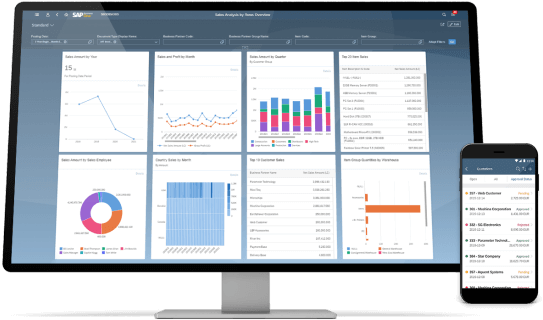
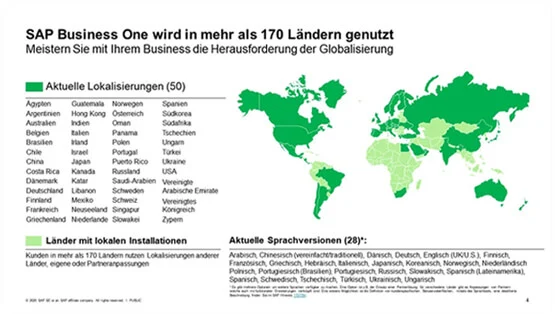
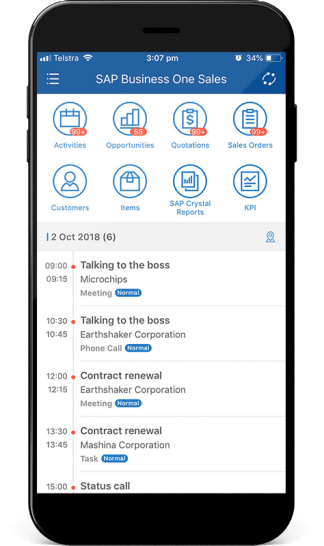
Embrace the flexibility and efficiency of mobile solutions with SAP Business One, ensuring your business operations stay ahead in the fast-paced world.
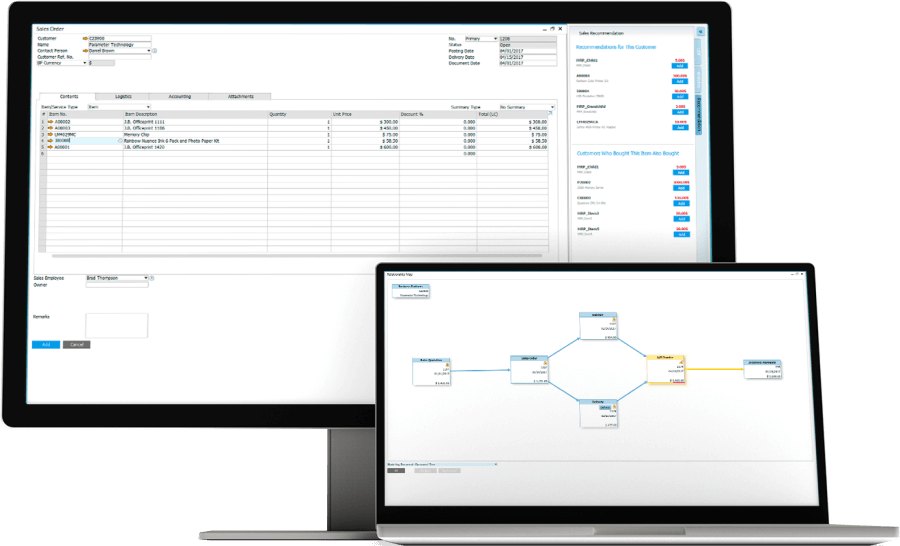
Streamline all your financial processes including accounting, reconciliation, cost accounting, and budget management.
Organize and monitor all sales, marketing, and customer service activities. Features include contact and opportunity management, quotations and order processing, as well as customer service and support.
Optimize the entire procurement process from purchase requests and orders to goods receipt and invoice verification, alongside inventory management and stocktaking.
Aid companies in planning and controlling their production processes with material requirements planning, production order management, and capacity planning features.
Manage projects from initiation to completion with planning, resource management, and cost control functionalities.
Provides tools to collect, analyze, and visualize data from all business areas for informed decision-making.
While not a complete HR module, it offers basic functions for employee management and administration.
Includes general system administration, user management, permissions, and customization of forms and reports.
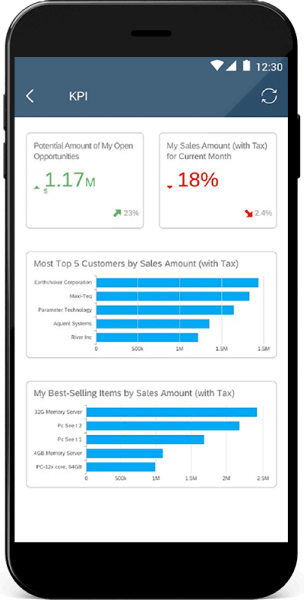
SAP Business One ERP is pivotal for SMBs, offering an integrated, centralized platform to manage all business processes efficiently. It enhances operational efficiency by automating routine activities and reducing manual errors, leading to time and cost savings.
Built-in analytics and reporting functionalities offer valuable insights into every aspect of a business. Real-time data access and analysis enable informed decisions and strategic planning.
The modular design ensures scalability, allowing businesses to add or expand functionalities as they grow or needs change, making it a future-proof investment.
Furthermore, SAP Business One improves customer relationships by enabling superior customer service. Complete transparency of customer data and interactions allows businesses to deliver personalized customer experiences and strengthen customer loyalty.
Overall, SAP Business One enables businesses to optimize resources, boost productivity, and navigate their operations successfully, making it an essential tool for any SMB aiming to enhance performance and remain competitive in the market.
The implementation of an ERP system varies based on a company’s unique needs and objectives, typically involving these crucial steps:
Identifying the company’s requirements to determine the necessary ERP functionalities.
Choosing the right ERP system and tailoring it to fit the specific business processes.
Transferring existing business data into the new ERP system.
Educating employees on using the ERP system to fully leverage its capabilities.
Continually maintaining and updating the ERP system post-implementation to ensure and enhance its efficiency.
An effectively implemented and utilized ERP system can bring significant benefits to a business, including enhanced operational efficiency, increased productivity, improved decision-making, and heightened customer satisfaction.
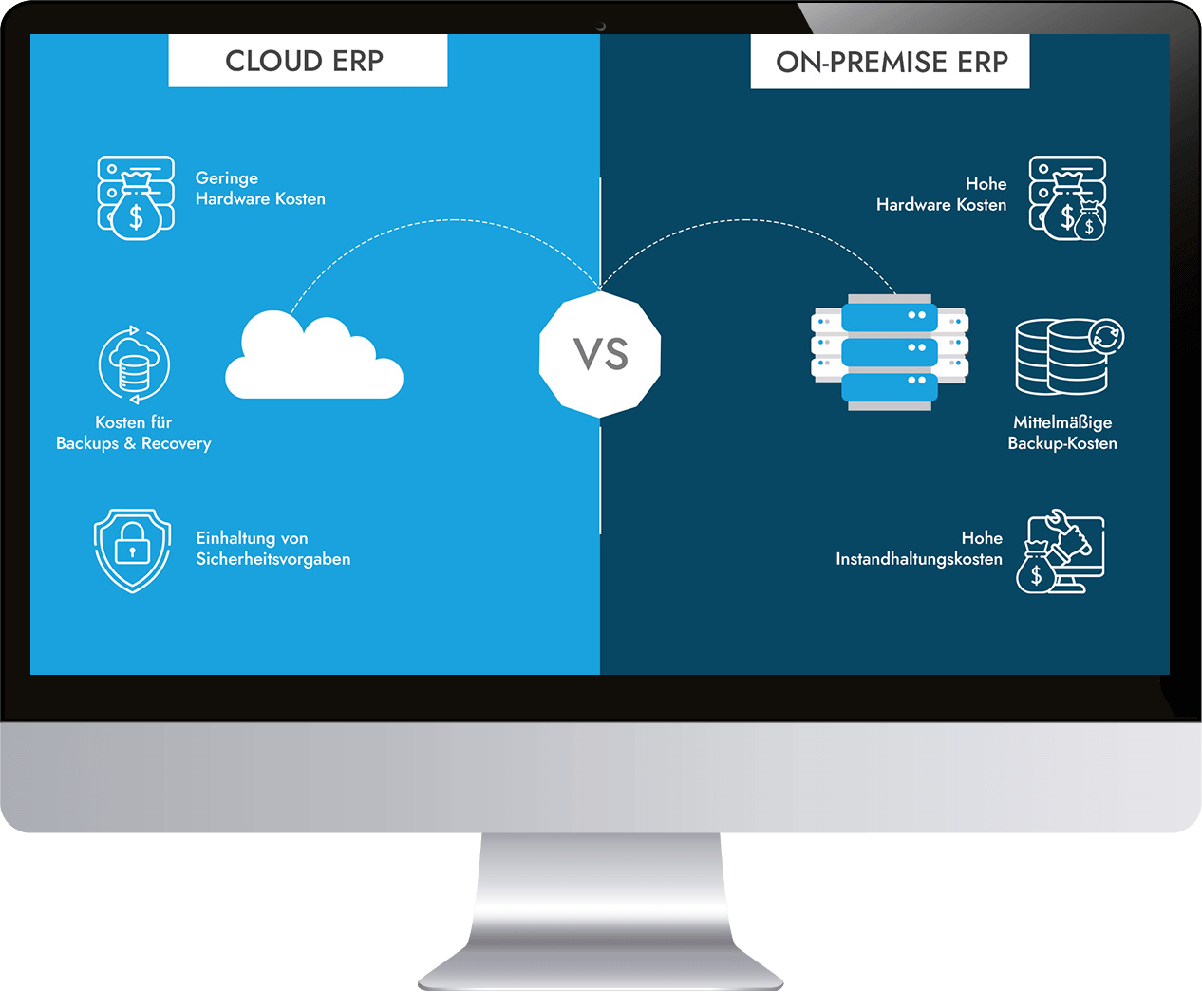
Cloud ERP and on-premises ERP systems offer distinct methodologies for deploying ERP solutions. On-premises ERP systems are installed and run on a company’s own servers, providing high customization and control but often requiring significant initial investment, IT resources, and ongoing maintenance. Conversely, Cloud ERP operates on a Software-as-a-Service (SaaS) model, where the ERP provider maintains the infrastructure. This approach demands lower upfront investment, facilitates rapid deployment, and ensures easy access to updates and innovations, albeit possibly offering fewer customization options and depending on the cloud provider’s reliability and security. The choice between cloud ERP and on-premises ERP depends on various factors such as specific needs, resources, and strategic goals of the business.
SAP Business One is an ERP software designed specifically for small and medium-sized businesses (SMBs), providing a comprehensive solution that aims to enhance operational efficiency, make informed business decisions, and improve market competitiveness.
Tailored to meet the unique requirements and challenges of SMBs, SAP Business One is easier to implement and manage than complex ERP systems developed for larger enterprises, yet it offers a broad range of functionalities including financial management, sales, purchasing, inventory management, production planning, and more, all designed to optimize business processes and aid management.
A key feature of SAP Business One is its scalability. It can grow with a business, allowing additional functions and modules to be added as business needs evolve, making it a future-proof solution that supports the development and expansion of SMBs.
Furthermore, SAP Business One provides extensive reporting and analytics capabilities, offering valuable insights into business performance. With access to real-time data, businesses can identify trends, monitor performance, and make data-driven decisions to propel their business forward.
Overall, SAP Business One is a powerful, flexible, and reliable ERP software tailored to the needs of SMBs, enabling businesses to optimally use their resources, streamline their processes, and achieve their business objectives.